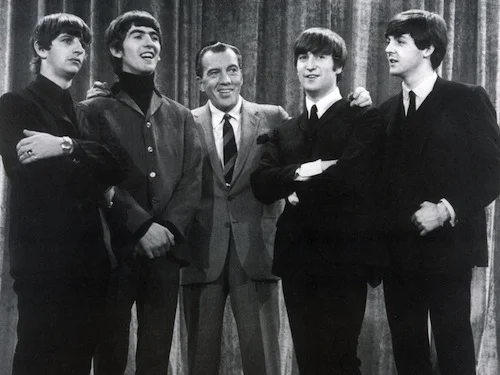This article originally appeared on Webb’s Feedback Blog.
 Music matters. It’s so integral and pervasive in our culture that it almost feels invisible. It’s even hard to imagine walking into almost any store without hearing music overhead. Culture provides a constant soundtrack to our lives. So it’s no wonder there’s so much discussion and debate about the business of music. It feels like a matter of life or death. And maybe it is.
Music matters. It’s so integral and pervasive in our culture that it almost feels invisible. It’s even hard to imagine walking into almost any store without hearing music overhead. Culture provides a constant soundtrack to our lives. So it’s no wonder there’s so much discussion and debate about the business of music. It feels like a matter of life or death. And maybe it is.
Lately, there’s been a surge in that debate as pioneers begin planting flags all over the Wild West that is the current music industry. I believe that all of these creative attempts at healthy disruption and problem solving are very good things. Ultimately, the best and most effective ideas and businesses will not only survive, they will be the blocks upon which we build the new music business, and this upon the wreckage of the one we’ve been watching go down for over a decade. As an artist and a music-lover (an owner and a client, if you will), I have a lot at stake in these discussions.
There has never been a better moment to be a middle-class or an independently thinking artist making and performing music than right now. The costs and complications of creating, recording, manufacturing, and distributing music are at an all-time low, enabling more music to be made and more artists to make a living than ever before. If your ego can bear not being rich and famous, you can make a respectable and sustainable living as a blue-collar musician. The problem used to be access; now it’s obscurity. And this brings with it a completely new set of problems and opportunities.
The History
More than 50 years ago, Sam Philips stood in the doorway of Sun Studios in Memphis, blocking Johnny Cash from entering unless he could conjure something worth the legacy of that historical room (without which Cash might have gone on to be an unknown and mediocre Gospel singer). Today, anyone can get sufficient resources to record and distribute their music, all from a Mac laptop. While this might mean some artists never receive the shepherding that could drive them to their potential greatness, I believe the net result is still preferable to having the old gatekeepers in place, deciding for everyone what is truly great. The tools are democratized and as a result, the market is flooded. The problem goes from having the chance to be recorded at all to that recording having the chance to be discovered and heard.
But as it tends to do, the market is adapting. The whole business used to be focused on the head of the sales curve, the handful of artists who were selling records in the millions of copies. But as music sales have sharply declined and fewer artists than ever are winding up at the head of that curve, attention is drifting to the “long tail” of the curve where thousands of niche artists live, none selling more than a few thousand records each. The power of the “long tail” is in the fact that its combined record sales are more than the combined sales of the top-selling artists occupying the steadily narrowing head of the curve. While there will always likely be a “hit” market resulting in a precious few artists moving records in the millions, the business is shifting to service these niches.
As I have navigated the business, especially over the last decade as a solo artist, I have noticed several gaps in the services available to blue-collar artists like myself. This is how NoiseTrade was born; I started this service in 2008 with several friends seeking to help artists find and meaningfully connect with their fans by trading free music for information and viral promotion. NoiseTrade has enabled thousands of artists (including myself) to have and cultivate direct relationships with their fans rather than having to depend on proprietary third parties such as Facebook, Twitter, and — not so long ago — MySpace, and therefore, having a job.
These connections are not only meaningful, they’re also valuable.
The Details
On Twitter, I recently said, “I make more money giving records away on @NoiseTrade (in exchange for info) than selling those same records on iTunes (let alone Spotify),” which resulted in some pretty interesting discussions. I said that in response to questions I received after criticizing streaming services like Spotify, which claim to offer a viable alternative to “piracy,” when in reality they offer artists almost no meaningful revenue or fan connection. And while iTunes is certainly a better financial model and more equitable for artists, it does almost nothing to connect the fans to the artists in a way that yields any long-term benefit.For example, I am paid $0.00029 per stream of a song on Spotify, and even this amount depends on whether the song is being streamed by a paid user or someone using the service for free. This means it will take upwards of 3,500 streams of a single song on Spotify to earn $1.00 versus that same revenue for one iTunes song purchase (not to mention the fact that Spotify refuses to pay the same amount to independent artists as they pay major labels, unlike iTunes).
Most would argue that it’s apples and oranges (no pun intended): iTunes is a digital storefront for artists while services like Spotify are about discovery. People will argue that low-cost streaming is good for the market, that it’s good for the artists, and that it’s still better than people taking your music for free from BitTorrent. But I tend to disagree on almost every point, mainly because it’s just not that simple. It’s true that iTunes is a place for people to purchase music, but it offers all the same benefits of Spotify in terms of discovery. And while Spotify is claiming to occupy the discovery space, it’s clear that the service is operating functionally as a storefront, since people are streaming music as an alternative to purchasing that same music.
I’ll go even further to say that I actually prefer illegal downloading over Spotify because when you get music illegally it’s at least implicit in the transaction that what you’re doing is potentially harmful to the artist. But with Spotify, your conscience is clear because you’re either enduring ads or paying to use the service and access the music. But from the blue-collar artists’ perspective, they’re not receiving any meaningful payment (there’s little discernible difference between $0.00029 and $0.00) and they are learning nothing about their fans, not to mention that music readily available on Spotify for little to no payment completely poaches the record sales upon which middle-class musicians depend for survival. This is why I will withhold any new releases from Spotify in the future.
But this is about much more than just revenue, which brings me to why neither iTunes nor Spotify can really compete with free music in either relational or monetary value.
If someone buys my music on iTunes, Amazon, or in a record store (remember those?), let alone streams it on Spotify, it’s all short-term money. That might be the last interaction I have with that particular fan. But if I give that fan the same record for free in exchange for a connection (an e-mail and a zip code), I can make that same money, if not double or triple that amount, over time. And “over time” is key, since the ultimate career success is sustainability. Longevity. See, the reality is that out of a $10 iTunes album sale, I probably net around a dollar. So if I give that record away, and as a result am able to get that fan out to a concert (I can use their zip code to specifically promote my shows in their area), I make approximately $10 back, and twice that if they visit the merch table. I can sell them an older/newer album and make approximately $10 back. The point is, if I can find some organic way to creatively engage them in a paid follow-up transaction, I increase my revenue 10 times on any one of these interactions.
This is all an equation of scale. I might be able to outright sell 20,000 albums for $10 each (again, netting around $1 each). Or I can remove any barrier from someone hearing about or discovering my music by giving it away, which will result in an order of magnitude more albums distributed, maybe around 100,000. If I can then convert 20% of those free downloads into paid transactions of any kind over time, I have probably well over doubled or tripled my money. And I can do this repeatedly as I continue to grow, learning more about and investing in my tribe to whom I now have a direct connection (rather than having to go through Facebook, Twitter, or Lord forbid, MySpace to access them).
And all of this by giving the music away for free.
The Conclusion
When you talk about free music, people who work in the music business will tell you you’ve gone too far. They’ll say you’re devaluing the art itself, and that once you go there, there is no coming back. I suppose I would agree if I thought that music’s only value was monetary. But I don’t.Music does have monetary value. But more than its monetary value is its emotional value, its relational value, its artistic value, even its spiritual value. When you make meaningful connections with people based on artistic self-expression, I think you’re actually increasing the value of that art based on the many ways it’s valued.
That said, I believe all of the aforementioned services will play some role in the emerging music marketplace. And I believe that artists should have every tool at their disposal when it comes to applying their creativity as much to the marketing and distributing of their music as to the making of it.
But any model claiming to be good for the music business that is bad for the individuals that make up that business isn’t really good. At the end of the day, blue-collar artists aren’t interested in propping up some nebulous idea of a “music business” so much as they’re seeking to build and sustain a career for themselves that enables them to make art honestly, without unnecessary and outside manipulation or consideration (like what people will buy or what will play on the radio). So the model that is preferable and most beneficial is one where the individual artists win, therefore causing the collective survival and health of the “music business.” If those individual artists survive, the whole business survives.
So please buy my music. Or take it for free. I’m honestly just grateful to have your attention. But this only works if we work together.
Derek Webb is a singer, a songwriter, an agitator, and Co-Founder of NoiseTrade. He lives in Nashville, Tennessee, with his wife and fellow singer/songwriter, Sandra McCracken, and their two children.

















